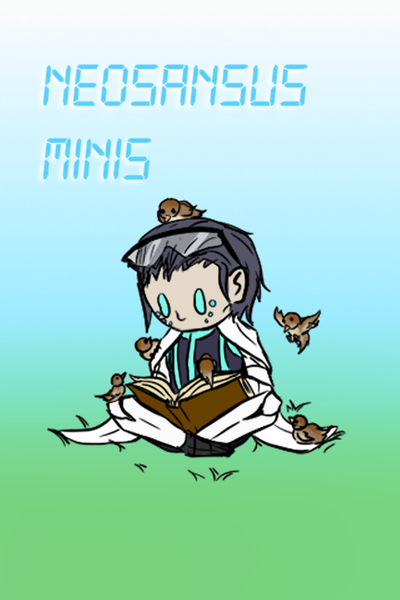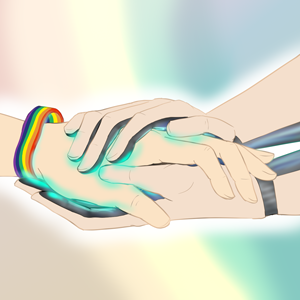Author's note:
This one-shot happens after the conclusion of "Deeper Meaning", but doesn't refer to any main plot points.
If this is your first introduction to the story, what you need to know is that Cain is an android therapist created by a company called "Neosansus", and treats patients through direct access to their mind and memories through neural mapping, using extremely accurate electrical signals, enabling him to alter or erase some memories, or simply discuss them with the patient (he's a a properly licensed therapist); Stanley and Lillian, who will be mentioned throughout, are the main two programmers who created his A.I
The patient was made to be anonymous in both their gender and orientation
[[ Accessing patient files ]]
[[ Uploading case file PR-1D3 ]]
[[ Summarized by Shain, Stanley ]]
[[ Due to confidentiality matters, details regarding the patient's identity have been omitted ]]
A patient in their late teens has arrived, accompanied by their parents. There's a clear juxtaposition between the two parties' approach to the upcoming therapy session with Cain, even to the untrained professional.
It's not uncommon for patients to look uncomfortable approaching this sort of new, innovative technology, and while it has been uncommon for patients to be young enough to still have a legal requirement to be escorted, the escorting party - typically parents, such as with case - often presents a supportive demeanor. In this case, however, the parents had a prideful look to them, like they had solved some long-standing riddle by coming here. On the other hand, the young patient looked mortified, more than just nervous, compared to other patients that came through here in the past.
As a matter of fact, this is one of the few cases to have a significant documentation prior to its approval, and has garnered some controversy upon getting submitted to Neosansus, due to some unusual expectations by the parents as to what they wish this treatment to achieve. Granted, no one in the crew handling the case thought there wasn't an ethical issue, but some have, rightfully, thought it's better to reject the case entirely, while others thought there might be a benefit to go through with it.
In the case's conclusion, it'll become evident that the latter option was surprisingly valid.
The parents appeared eager to see the treatment for themselves, but Lillian has taken the mantle of courteously reminding them of the company's patient-privacy policy, meaning that unless the patient has asked, no one else is to be allowed in the therapy room with them. They seemed disappointed, but Lillian has the remarkable ability to let people down gently and make them more complacent, and so the parents remained in the designated waiting room.
Soon after the patient has been briefed over the general course of the therapy before being escorted into the room, where Cain has already been expecting them.
[ Following input submitted by C.A.I.N ]
Anxious patients were hardly a novelty for me at this point. People who arrive in my care typically are, aside from the understandable uneasiness of confining to an android. I've come to expect as much.
But my new patient was different. Not only they were younger than most of my patients, but what I perceived as anxiety at first looked more like sheer terror by the second. They weren't technophobes nor had any history being afraid of mannequins or other human-like objects.
I scarce to believe I was the one they were afraid of, but I had to make sure.
"Does my presence make you uncomfortable?" I asked, watching their darting eyes focusing on me for a brief moment before traveling around the room again.
"N-no, it..." they stammered, clearing their throat but falling silent for another moment. "It's not gonna hurt, right?"
It was a common question, but not one that came up this early into the session. Usually it's asked right before the neural mapping, if it's used. But my new patient sounded pretty sure that this is where our session is going. "It will not, this company has invested a lot of effort into making this process painless and to eliminate discomfort."
They nodded, hands clenching on their lap. Another silent moment went by as they breathed deep, opening and closing their mouth in an attempt to say something, repeatedly regretting it. There was a momentary look of relief, but it was quickly drowned in their paling complexion. "Let's...l-let's, um..." they struggled, "can we just...j-just get this over with?"
The patient's file merely said the parents' demand was to 'make them better'. It was unusual, but happens sometimes when patients receive a direct appointment at the complex rather than get a referral from another therapist. However, their behavior didn't strike me as problematic. Not enough so I'd be the first one their parents would turn to. The patient's file didn't state mental or physical details to go by, so it was up to me to deduce why they were here, as they were keen on getting to the solution of what ills them. "We haven't even started, how could we already finish it?" I offered a smile to lighten the mood, but it didn't make a difference. "How about you tell me why you're here? I'd like to hear it from you so I can properly take care of you."
I noticed they flinched at my words. Perhaps it wasn't the best choice of phrase. They bit their lips, taking another deep breath while still avoiding any eye contact. "My...my parents brought me. They said you can, um...that you...that you can..." they struggled again, looking almost sick at the words slipped past their teeth, "that you can fix me."
"Fix you?" I repeated. My auditory receptors were perfectly functional, and yet I wanted to be sure.
They winced, like hearing it from someone else was even more painful than saying it themselves. Tears welled in their eyes as they forced themselves to nod.
"What is it about you that they wish to address?" I found a gentler way of putting it, but they just went silent again, hunched into themselves. Sure, most humans found it difficult sharing personal things with a stranger on the very first meeting, even a professional, and me being an android doesn't always help. But I had to at least strive to find out, as part of my duty as a therapist. "Would you mind if I take a look?"
Their eyes shot at me. If they would get any paler they'd be translucent at this point. Tears already straining their face, they looked scared, too scared to even move their head to answer.
"It's just taking a look. You don't fix something without seeing the problem, right?" I slowly got up, motioning to the therapy chair in the room. It took a few more moments before they finally nodded and moved to the other seat, lying down with their head now just below my chest height. "I won't do anything besides looking, okay?" I moved to their front to not be looming over them. Activating the sensors in my hand, I turned it over and let them feel it.
Hesitating at first, curiosity seemed to have won them over and they reached a trembling hand to my palm, recoiling when first feeling the electricity's tingle, but then trying again, realizing it doesn't hurt, until they were fully holding my hand, lips quivering into a faint smile as harmless blue sparks tickled their skin.
I moved to head back to position in order to scan their head, only to find out they still had a solid grip on my hand. "You're just looking, right?"
I nodded.
They held tighter for a moment, "promise?"
I smiled again, holding back to their hand. "Promise."
While they still looked stressed, a few deep breathes later they released my hand, calming down enough for me to get a clear scan. "You'll feel like you're falling asleep, you won't be able to move and you might see flashes of the memories I'm scanning. It's perfectly normal."
They tensed up again. "Wh...what you're going to see...will my parents see it, too?"
"No. The memories I scan are data only I can access, and can't share without express permission from the patient, whether as a file or my own description of it," I assured them as I placed my hands over their head, moving my fingers to the proper key points according to my overlay. "It'll be our little secret."
I could feel them nodding again, somewhat calmer, as they settled and closed their eyes.
I've never seen memories as colorful before; there was joy, and love both expressed and received by this patient that for most of the scan I couldn't fathom why they'd be so nervous.
Until later memories, more recent ones, came to view. The color was lost as images of the parents came up, scolding, scowling. Their voices were muffled, an indication that the patient has desperately tried to drown their words, expelling them from their memories, but there were still echoes of it. They weren't happy with who their child was; with who they chose to be with, despite having never met the other person, just by hearing of them, and despite how happy that relationship made their child.
Feeling my patient struggle and their heart racing, I slowly and safely terminated the scan, helping their shivering form out of the chair and back to the much comfier seat. They appeared shaken, face all wet from tears, so I offered them some tissues and a cup of cold water.
They agreed, taking a few more moments to calm down again. They were afraid now that they knew what I saw, I could tell. They were waiting for the verdict.
"I don't understand," the words left me before I could even formulate my whole sentence in the silence that fell between us once more.
"You wouldn't, just like my pare-"
"No, it's not that," I had to cut them off, seeing their distress. I usually avoid doing that, but this was different. "You said they wanted me to 'fix you'...but I see nothing wrong with you."
"That's not what they said..."
This was not the first time I've heard a line like this from my patients, each in different context, but when it refers to something a patient's parents say that causes such distress, it hits different. "Right now, I'm the authority here," this was something I felt had to be established. I took a knee in front of them to reach below their eye-level. I may be an authority, but I wouldn't want them to feel intimidated. "In fact, it might be their perception that needs 'fixing', but as for you...I simply saw genuine happiness as you were spending time with someone you love, and I don't see how it matters whether they're the same as you or the opposite, because clearly being told you can't be together has caused you distress," I paused, watching how their expression changed. It was a mix of surprise and relief, and it danced between flashes of confusion and concern.
"They…t-they said it was…’unnatural’…” accepting my authority over their parents still seemed to be just a tad difficult.
Understandable. “And yet they took you to an android therapist, in hopes some morally-voided machine would zap your brain into normativity. Now, which sounds more unnatural?”
They coughed out a tearful chuckle, drying their face again with the ball of tissues clenched between their fingers.
Clearly, they knew the answer to this one. “I understand now why you were so nervous coming here, thinking they’ll erase all that love from your head. I know humans have regrettably tried, throughout history and even in recent and current times to do so, with devastating consequences to those subjected to it. My directive is to make humans better, and I promise you that no patient that comes through these doors and put under my care would ever be subjected to such atrocious practices,” seeing they were calming down, I slowly reached to hold their hand, “alright?”
They held back, tightly, as they nodded, a smile of relief adorning their face.
"Good. Now, I think it might be better I have a chat with your parents, if the board approves.”
[ Input end. ]
And approve they did.
The parents got an earful from the committee about even getting the impression that Cain’s abilities would be considered for conversion therapy.
They were as perplexed as some of us were with the decision to accept their rather blatant request in the first place with the promise they could pay extra for the more ‘direct route', as they have clearly been declined before (I find it noteworthy to mention the whole sum that they paid was donated to a local LGBTQ-supporting charity of the patient’s choosing). It was agreed that it’d be easier to just turn them down, but some have said it could be a good learning experience for Cain.
It certainly served as a one, both for the parents who will hopefully be more open-minded from now on, as well as for Cain. At this point in time this case has been unprecedented in Cain’s repertoire, and those who wanted to let him handle it were mostly curious about his judgment on the matter. Of course, the patient was never in any harm of conversion at any point, with Cain still being under supervision and often still consults the crew in new cases.
Cain appears to harbor sympathy to those who feel like they’re “broken", and even being able to emphasize with them, being the unique individual that he is. While he was never introduced to the subject officially, his guiding logic towards the mental well-being of his patients has allowed him to put it above any bias surrounding this subject.
We hope that future issues of sexual orientation and gender identities that arise and brought to our care would be far in between, but we have full confidence that Cain is capable of handling them with the utmost care at to the best possible results.
[[ Case end. ]]











Comments (0)
See all